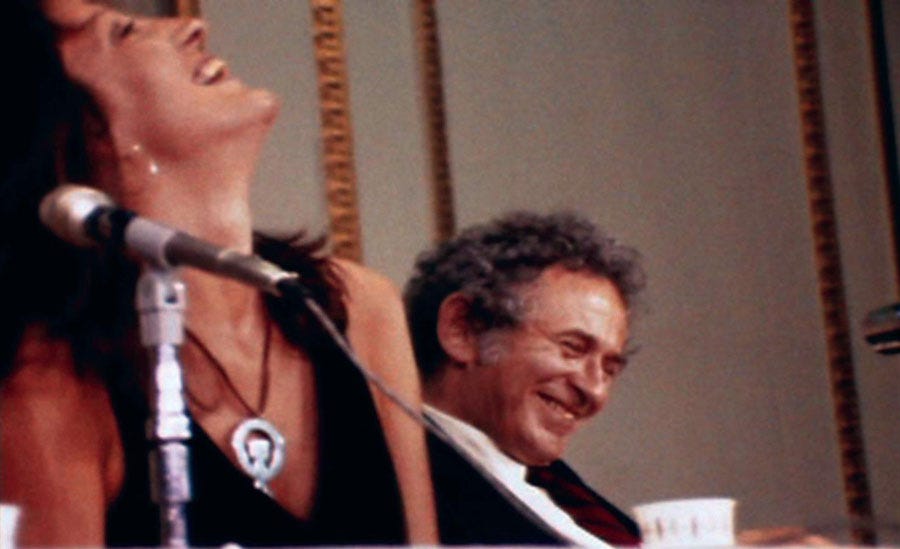The Barbaric Yawp of Utter Adoration
My attention span has been terrible these last few weeks. I always get a little single-minded when Spring comes on, unable to concentrate on anything unless I’m sitting in my backyard with the sun on my face. Not even movies, usually the surefire way to get me glued in the one place, have settled me — with a single important exception. Earlier this week, absent-mindedly looking for something to have playing in the background while I fold laundry, I took a chance on D.A. Pennebaker’s documentary Town Bloody Hall and found myself more uplifted than I have been by a film for some time.
Town Bloody Hall is about 90 minutes long, and considerably un-showy — it’s a document of a panel hosted by American novelist Norman Mailer shortly after the publication of his article ‘The Prisoner of Sex.’ That piece, printed in the pages of Harper’s, saw Mailer messily assert his belief that the goals of feminism will always be undone by biology. Of course women will be treated differently from men, Mailer wrote, because they physically are different. In the opening pages of the essay, Mailer tasks himself with trying out the housework, investigating the “woman’s lot”, and claims, with much relish, that he found cooking and cleaning a simple walk in the park compared to the great duties of men.

It’s a work of trolling, then, and ideologically empty trolling at that; nothing more than a lazy bit of contrarian whining. And yet the piece caused a huge stir, eventually leading to the Town Bloody Hall panel, billed as Mailer vs. The Feminists — a one-night only event in which Mailer was taken to task by writer Germaine Greer, poet Jill Johnston, activist Jacqueline Ceballos and critic Diana Trilling.
And yet those expecting that the film will be a document of some intellectually ravishing debate will be disappointed. Mailer can barely even control the audience, let alone his own arguments — throughout, he is pelted with heckling from all ideological corners. The crowd screams, boos, storms out. Every round of applause is sprinkled with invective, like bits of broken glass in a bag of sugar. Halfway through, one woman in the pulpit casts her ire at all involved — “I couldn’t even afford to pay to get in here,” she shouts. “How does feminism account for that?”
The joy is in the chaos. Johnston, the poet, delivers a long piece of free-association in which she argues that the end goal of feminism should always be to get rid of men entirely. Mailer, frustrated, tries to respond. But Johnston keeps talking. Eventually, Mailer breaks. “Damnit Jill,” he says, slamming his hand on the table. “I want to talk to you about lesbians.”
Mailer comes off the worst, of course. Red-faced and quick to shout, he only manages to upkeep something like “witty repartee” for a matter of minutes. Before long, he’s calling members of the audience “cunty” and bubbling at the mouth. When it comes time to take questions from the audience, a young Cynthia Ozick, the acclaimed short story author, makes a crack about Mailer’s writing so devastating that he actually looks bashful.
Perhaps surprisingly, given her now near-constant transphobia, Germain Greer comes off the best. Her skill is in revealing Mailer’s dopiness; she ducks past every single one of his barbs, leaving him sputtering and confused. When it comes time for her to deliver her own mission statement, she does so with poetry. “The barbaric yawp of utter adoration for the power and the glory and the grandeur of the female in the universe is uttered at the expense of the particular living woman every time,” Greer says at one point, reading from a scrap of paper. “And because we can be neither be goddess nor menial with any piece of mind, because we are unfortunately improper goddesses and unwilling menials, there is a battle waged between us.”
If all this isn’t enough, a few minutes later, Susan Sontag pops up, asking a question from the audience. There are few humans I think more highly of than Sontag, and she does not disappoint — quietly, in a stark contrast to all the shouting that’s been going on, she pushes back against Mailer’s use of the phrase “lady critic” when introducing panelist Diana Trilling. When Mailer responds with his most openly misogynistic hate speech of the night — “I wished to say that she was the best in kind,” — Sontag doesn’t bat an eyelid, even as the room erupts around her.
But the importance of Town Bloody Hall is not just the joy of watching some kind of spectacle; the screaming noise of a room slipped out of control. It is also the eerier jolt of recognising how little some arguments have changed. Mailer’s defence that he likes feminists just fine, only he wishes that they wouldn’t hate men so much, has grown more common in certain corners of the internet in the decades since the film’s release. So often we think of ourselves as existing in a priveleged moment, our battles fresh. Town Bloody Hall proves that certain sides are still operating the same rusted machinery that their grandfathers used.
At the end of the panel, Greer thanks Mailer. Kind of. “This was useful,” she says, quietly, as the crowd are filing out. He doesn’t say anything. He just nods, his eyes sort of glazed over, not a boxer at the end of ten titanic rounds, but a sad old man sitting in a puddle of his own vinger-stinking sweat. It would be a sad sight, maybe, if his crucifixion hadn’t have been so much bloody fun.
Town Bloody Hall is available to watch on the Criterion Channel. Otherwise, there is a worse quality copy of the film that you can watch in its entirety for free, on YouTube, right here:

